Do you know the median rent in the U.S. is $1,379 a month? When thinking about your future, choosing between renting and buying senior housing is crucial. This choice affects your living situation, money matters, and lifestyle for years ahead. In this piece, we’ll look closely at renting vs buying senior housing pros cons. We aim to explore both sides to help you decide wisely. Whether you want more freedom or a lasting investment, knowing the main factors is key to making the best choice for your senior years.
Key Takeaways
- The median rent in America is $1,379 per month, highlighting the ongoing cost of renting.
- Zelle and Venmo have transaction limits and fees that can affect rental payment convenience.
- Payment through checks or cash poses various risks including errors, delays, and losses.
- The highest APY for CDs now stands at 4.65%, a significant increase from early 2010s rates.
- Federal insurance protects deposits in CDs up to $250,000 per depositor, ensuring financial security.
Understanding Senior Housing Options
Finding the right senior living option can be tricky. Knowing what’s out there and what you need makes it easier. Let’s look at what kind of senior housing matches your way of life.
Types of Senior Housing Available
There are many senior housing options for different needs and independence levels. Here are the main types:
- Independent Living: Great for seniors who want to live on their own with amenities but no medical services.
- Assisted Living: For those who need a little help with everyday tasks like getting dressed or taking meds.
- Continuing Care Retirement Communities (CCRCs): These communities offer a range of care, from independent living to nursing care, as your health needs change.
https://www.youtube.com/watch?v=yT8x4Rt9yIc&pp=ygUSI3JlbnRhbHByb3NhbmRjb25z
How to Evaluate Your Needs
Choosing the right senior housing starts with knowing your needs. Think about these factors:
- Level of Independence: Figure out how much daily help you need. This helps decide if you need independent or assisted living.
- Health Requirements: If you have ongoing health issues or trouble moving, assisted living or CCRCs could be better.
- Budget: Know the costs of each option to make a smart choice.
- Social Connections: Having friends and activities is important. It should be a big part of your decision.
Making the Right Choice for Your Lifestyle
Once you know your needs, you can pick a senior living option that suits your life. Look at the activities, amenities, and care each place offers. Choose a spot where you’ll be happy and healthy, whether it’s independent living or another option.
| Feature | Independent Living | Assisted Living | CCRCs |
|---|---|---|---|
| Type of Care | Minimal | Moderate | Comprehensive |
| Amenities | High | Moderate | Varied |
| Cost | Lower | Mid-range | Higher |
| Level of Independence | High | Moderate | Varies |
Choosing between independent and assisted living depends on your own needs. Take your time to think about what will make your future bright and comfy.
Pros of Renting Senior Housing
Renting senior housing comes with benefits worth thinking about. It offers flexibility and can save costs. This is great for those who like choices.
Flexibility in Location and Living Arrangements
Flexibility is a big plus with senior housing rentals. You can move easily if your needs or wants change. You aren’t stuck because you don’t own the property.
It’s easy to try living in a new city or state. This lets you check out different places and communities freely.
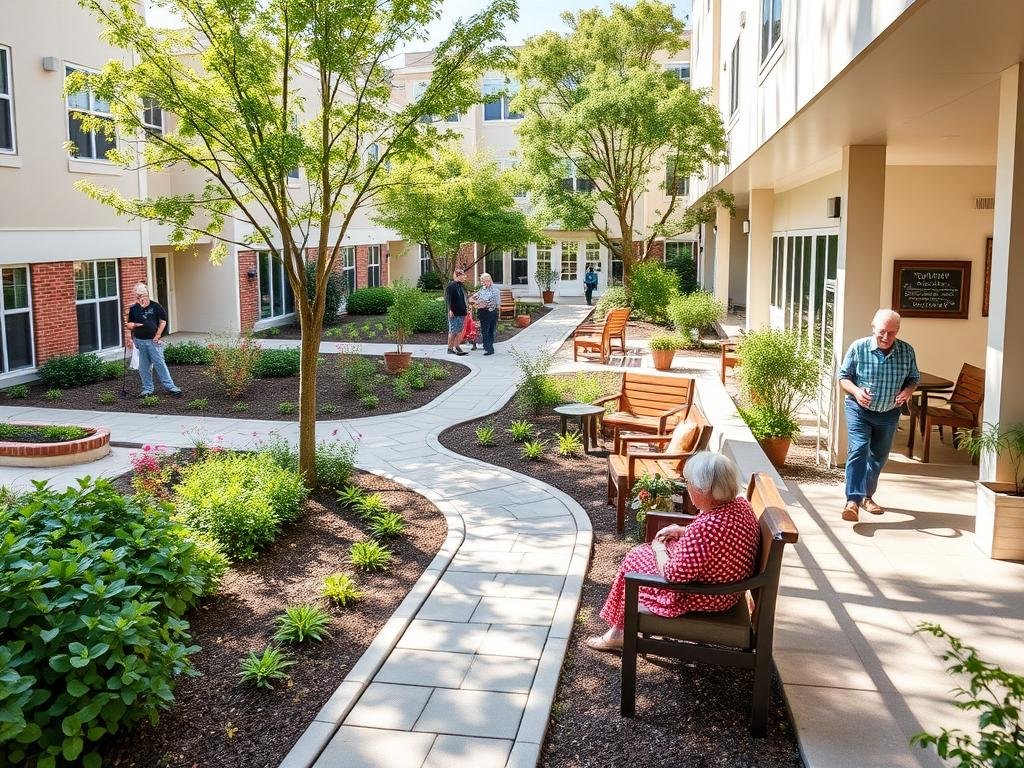
Lower Upfront Costs and Maintenance Responsibilities
Renting means lower upfront costs than buying a home. You’ll likely need just a security deposit and the first month’s rent. This is easier on your wallet.
The property owner usually handles maintenance. So, you have more time and money for fun or other important things. This helps you keep more of your savings.
Trial Living Experience in Different Communities
Renting lets you try living in various places without a long-term commitment. This helps you understand what you like. It’s a good way to find your ideal spot.
It’s a no-risk way to see different neighborhoods. You can find the perfect community that fits your lifestyle. This is key for your golden years.
- Stay flexible with location choices
- Benefit from lower initial costs
- Enjoy minimal maintenance duties
- Experience different communities before making a commitment
Keep these benefits in mind when thinking about senior housing. They can guide you to make a choice that suits your life and budget.
Cons of Renting Senior Housing
Renting senior housing has its perks, but it’s crucial to look at the downsides too. These cons can greatly affect your future plans and happiness. Let’s dive into these drawbacks.
Limited Control Over Your Living Space
Renting means you can’t easily change your home to suit your style. You’re often stuck with the rules of your rental agreement. This makes it hard for those wanting a personalized space.
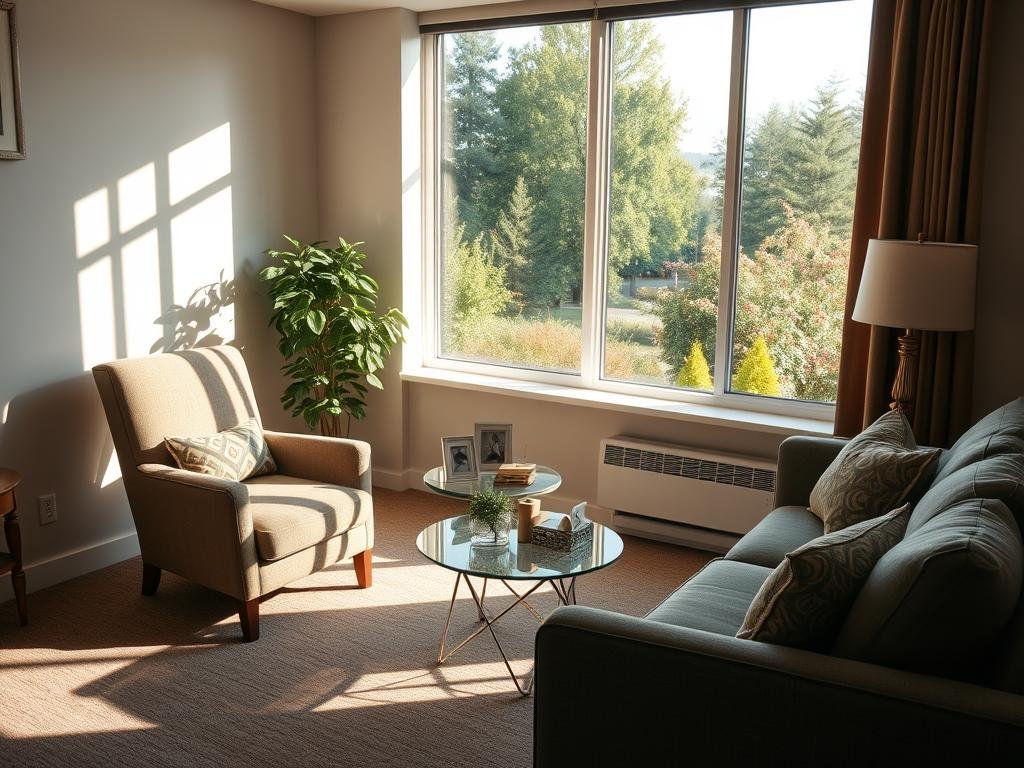
Possible Rent Increases and Uncertainty
Think about how rent might go up when you’re planning for the long-run. Your living costs could increase, making it hard to plan your money. This can threaten your financial peace of mind.
No Equity Buildup for the Future
Unlike owning a home, renting doesn’t let you build equity. Owning a home is an investment that can grow your wealth. Renting misses out on this chance, affecting your financial future. So, think carefully about this when making housing decisions.
Pros of Buying Senior Housing
Thinking about getting senior housing? Well, it’s a smart way to plan for your future financially. We’ll dive into the top perks of making this investment.
Building Equity Over Time
With senior housing, you get to build equity. This can lead to great financial security as house values go up. Unlike renting, owning a home means you’re investing in your future.
Stability and Control Over Your Property
Buying senior housing offers long-term stability. It means you’re in charge of where you live, without worrying about lease renewals or rent hikes. You also get to change your place as needed.
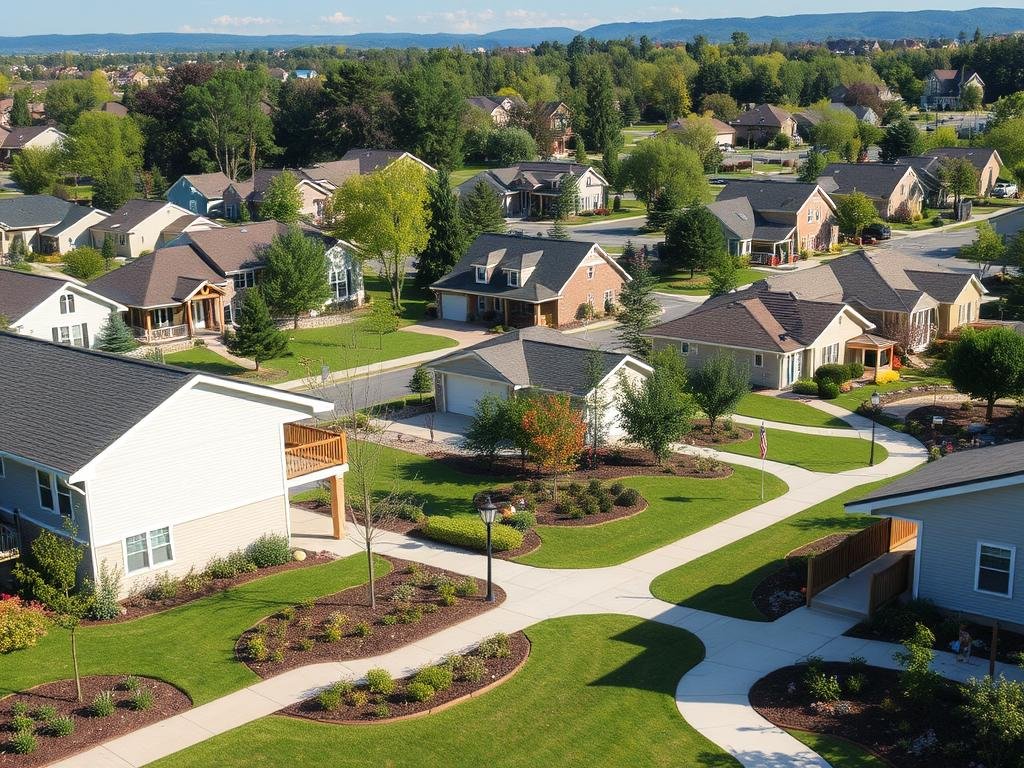
Potential for Customization
Owning senior housing lets you customize your home. This way, you can make it work just right for you, boosting both comfort and happiness. From safety tweaks to kitchen makeovers, your home can grow with you.
Cons of Buying Senior Housing
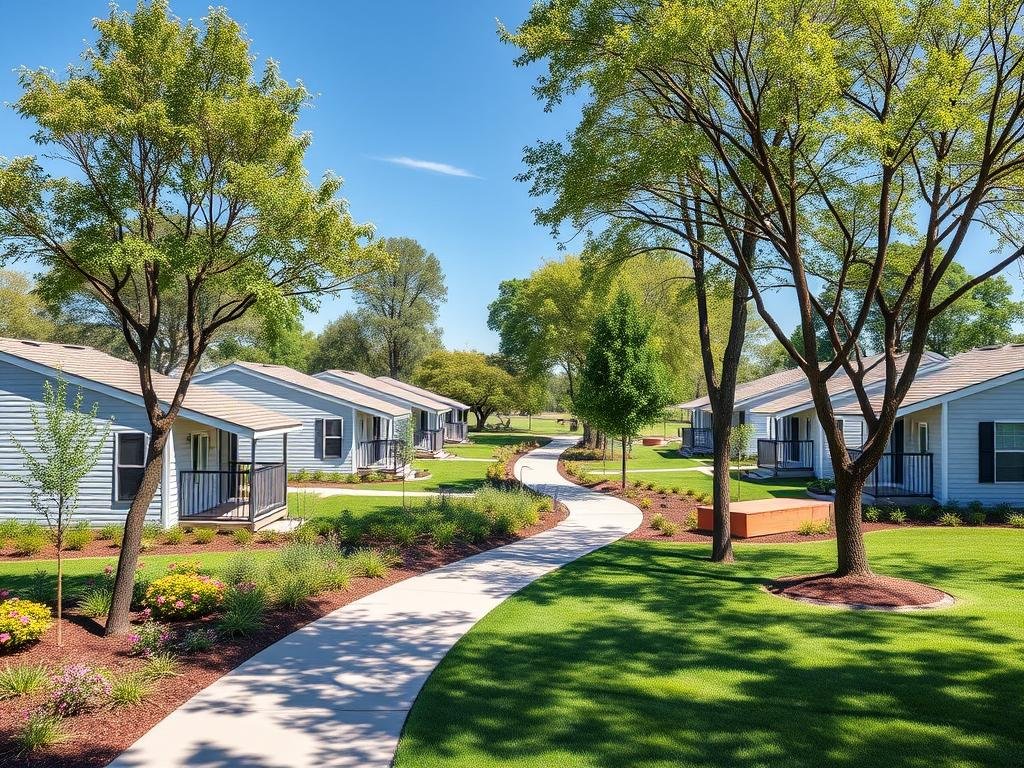
Buying senior housing might seem like a sure bet at first. Yet, there are several downsides to think about. The financial and physical demands can become a burden, especially as you get older.
Higher Initial Costs and Financial Commitments
One big problem is the high upfront costs. You’ll face down payments, closing costs, and maybe renovation bills. A senior housing affordability analysis can help. It shows if you can manage these costs and day-to-day expenses.
Responsibility for Maintenance and Repairs
When you own a home, you must keep it up. This includes all repairs and maintenance. As you age, this responsibility can get harder. Handling these chores or hiring help can lessen the perks of senior housing long-term planning aimed at an easy retirement.
Potential for Real Estate Market Fluctuations
The real estate market is always changing. Values of properties can go up or down. If the market falls, your investment’s value could drop. This risk is big in senior housing long-term planning. It’s important to be ready for market shifts that could hit your plans.
Let’s compare potential costs and issues with different payment methods:
| Payment Method | Challenges | Fees |
|---|---|---|
| Zelle | Daily and monthly limits pose issues | None, but restrictive limits |
| Venmo | Business and instant transfer fees | 1.9% plus 3% credit card fee |
| Cash | Time-consuming, risk of theft | None |
| Checks | Tracking difficulties, theft risk, bounced checks | None specified, but potential bounce check fees |
Knowing these cons is key for anyone looking into senior housing. With a good senior housing affordability analysis and smart planning, you can tackle these issues. This helps you make choices that fit your life.
Financial Considerations When Renting vs Buying
Choosing between renting and buying senior housing means looking at financial details. It’s key to check if renting or buying fits your budget and future money needs.
Analyzing Your Budget for Each Option
Start by checking your budget for renting and buying. Renting’s median cost is about $1,379 monthly in the U.S. This might be easier to handle than buying’s up and down costs.
Buying needs a big initial payment, plus ongoing costs like mortgage, insurance, taxes, and upkeep.
Understanding Long-Term Costs
Knowing long-term costs is crucial for planning senior housing. Renting is flexible and requires no maintenance costs, but doesn’t build equity. Buying means long commitments and costs but can increase your wealth over time.
For a clear view, here’s a table comparing long-term renting and buying costs:
| Cost Element | Renting | Buying |
|---|---|---|
| Initial Costs | Security Deposit | Down Payment |
| Monthly Costs | Rent | Mortgage Payments, Property Taxes, Insurance |
| Maintenance | Covered by Landlord | Homeowner’s Responsibility |
| Long-Term Financial Benefit | None | Builds Equity |
Tax Implications of Buying vs Renting
It’s also smart to consider tax effects. Renting offers no tax perks, but owning a home does. Homeowners can deduct mortgage interest and property taxes from taxes. This is a big deal for your budget and making a choice between renting or buying. A thorough analysis will help you pick the best for your financial future.
Lifestyle Considerations
What you like in life really matters when it comes to choosing where to live as you age. The feel of the place, how easy it is to get what you need, and being able to see doctors matter a lot. These things shape how happy and healthy you will be.
Community and Social Life Factors
Being around others and making friends can make you happier and healthier. Senior places have fun activities, clubs, and events to help you meet people. When looking at options, think about how much you can do and meet others. This keeps you feeling good, both in mind and body.
Accessibility and Convenience Needs
Finding a place that’s easy to live in is important. Look at how close stores and buses are. Senior-friendly places have no stairs, wide doors, and things you need close by. This helps make every day easier.
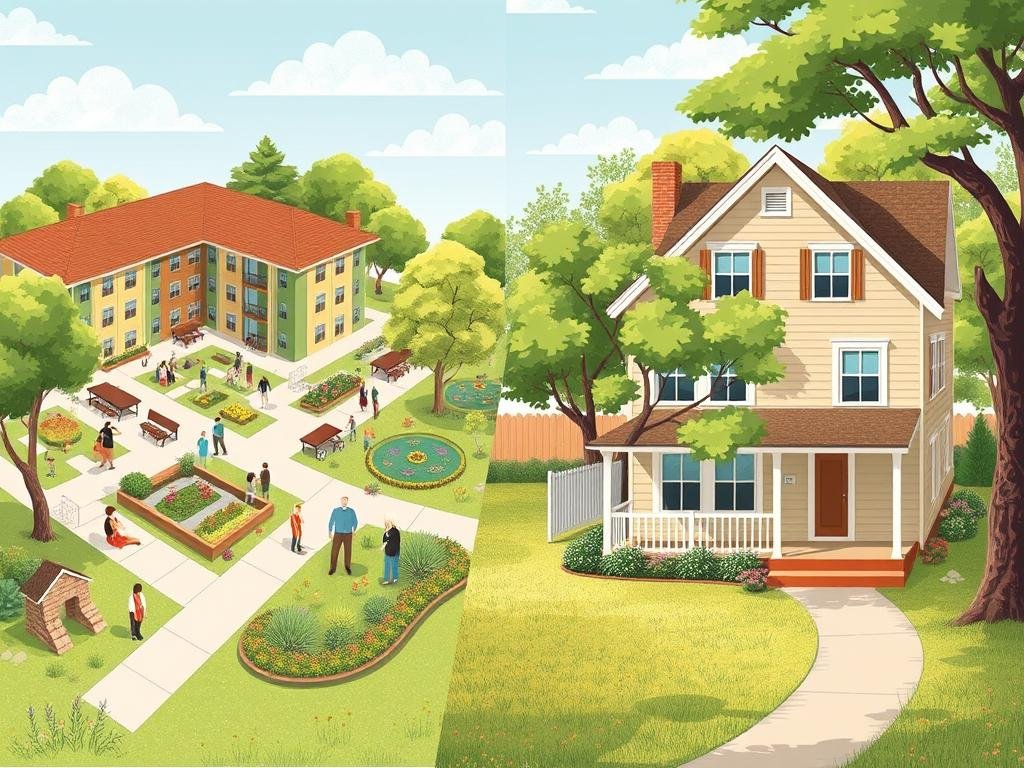
Health Services Availability
Being able to see a doctor easily is a big part of choosing where to live. Some places have doctors on-site for when you’re sick or need a check-up. This can make you feel safe and well taken care of.
Emotional Factors Impacting Your Decision
Your feelings play a big part in choosing senior housing. It’s not only about money; it’s also personal and affects your happiness. Let’s look at some emotional factors that matter.
Attachment to Home vs Freedom of Renting
Many seniors see their home as their “forever home” and hold it dear. The idea of leaving a place full of memories is hard. On the flip side, renting lets you move easily without buying’s long-term commitment, providing benefits that might be better than staying put.
The Role of Independence in Your Choice
Being independent is key in deciding on senior housing. Owning your place gives you control and freedom. But, renting can mean fewer chores, giving you more time to enjoy retirement. It’s important to balance independence with everyday needs.
Family and Caregiver Considerations
Your choice also affects your family and caregivers. Staying close to family might push you to rent or buy. Senior housing rental options might make getting caregiver help easier, a big plus if you’ll need support later. Talking with your family can help make your decision clearer and supported.
Making the Best Choice for Your Situation
When choosing senior housing, it’s key to first look at what you want and value. Do you look for a place with lots of social opportunities, or do you want your own space? What you prefer and your future plans should guide your choice.
Assessing Your Personal Goals and Values
Knowing what’s important to you helps make choosing easier. Think about how you live now, your health needs, and if you might need more help later. Do you like the idea of renting, or would you rather own your home? Choosing based on your values makes for a happier life.
Consulting with Financial and Housing Experts
Getting advice from pros is crucial for a smart choice. Talking to financial and housing experts gives you a clear picture of money matters and the good points of different options. They look into costs, tax advantages, and any risks. This helps you see all angles.
Creating a Decision-Making Checklist
Having a detailed checklist makes deciding on senior housing easier. Write down what you must have, your budget, and where you might want to live. Add advice from your talks with experts. This organized way lets you consider everything important, leading to a choice you’ll be happy with.
FAQ
What are the pros and cons of renting vs buying senior housing?
What types of senior housing options are available?
How do I evaluate my needs when choosing senior housing?
What are the benefits of renting senior housing?
What are the drawbacks of renting senior housing?
What are the advantages of buying senior housing?
What are the disadvantages of buying senior housing?
How should I compare the financial aspects of renting vs buying senior housing?
What lifestyle factors should I consider when choosing senior housing?
How do emotional factors influence my decision between renting and buying senior housing?
How can I make the best senior housing choice for my situation?
Source Links
- What are the risks of using Zelle, Venmo, Cash, or Checks for rent payments?
- What are the risks of using Zelle, Venmo, Cash, or Checks for rent payments?
- Top CD Rates Today: January 23 — Earn Up To 4.65% APY
- 32 Completely Unhinged Things Literally Everyone Experienced In High School That Seem Like They Should Be Illegal In 2025
- Master Lock’s world headquarters in Oak Creek is closing, jobs relocating to Illinois
- Columbus landlord sued after Southeast Side apartments evacuated due to lack of heat
- Government demands answers from Apple over iOS 18 performance problems
- Diana Stanley, advocate for Palm Beach County’s homeless, retiring as The Lord’s Place CEO
- Professors teaching Gen Z say they’re more anxious than millennials and have already given up on the American Dream
- Elon Musk Thinks Now Is the Perfect Time for a Load of Nazi Jokes
- Rates down | Current mortgage and refinance rates, January 23, 2025
- Billionaire Developer Caruso Slams LA Leadership Over Wildfires
- Adorable Orphaned Squirrel Found Herself A New Family Of People And Their Bond Is Heartwarming
- How Does a Reverse Mortgage Work? A Comprehensive Guide for Homeowners
- Should you buy before you sell or sell before you buy? – Surf Coast Times
- Royal Caribbean Blog – Unofficial blog about Royal Caribbean cruises
- Trump won’t ban immigration arrests at churches. Now clergy are weighing how to resist
- Leaky, crowded and hot: Louvre boss slams her own museum
